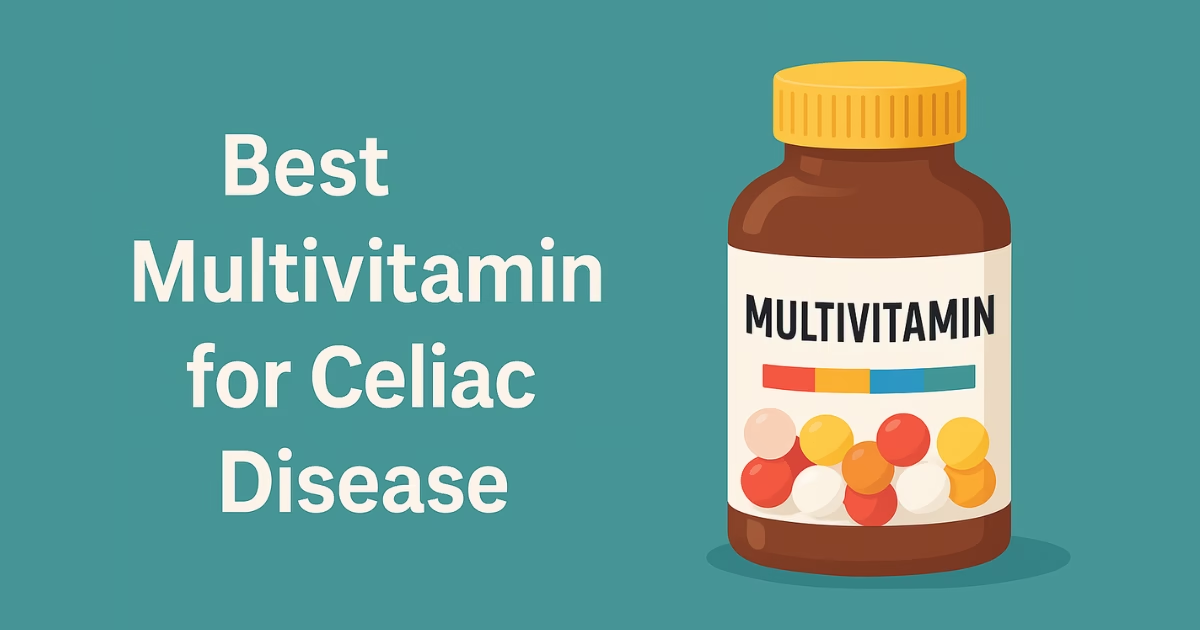Celiac disease is an autoimmune disorder that affects the small intestine, causing difficulty in absorbing essential nutrients. This condition can lead to several deficiencies, including vitamins and minerals that are crucial for overall health. For individuals with celiac disease, finding the best multivitamin for celiac disease is an essential step in managing their nutritional needs. Since the condition impairs the body’s ability to absorb nutrients from food, supplements become an important tool in filling those gaps. Multivitamins designed specifically for celiac disease should not only be gluten-free but also provide a comprehensive range of essential nutrients to support immune function, bone health, and energy levels. Choosing the right multivitamin can help improve the quality of life for individuals with celiac disease, ensuring they get the nutrients their body needs to thrive.
Why Multivitamins Are Essential for Those with Celiac Disease
Celiac disease significantly impacts the digestive system, primarily the small intestine, making it difficult for the body to absorb vital nutrients. When someone with celiac disease consumes gluten, it triggers an immune response that damages the lining of the small intestine, leading to inflammation and malabsorption of nutrients. As a result, people with celiac disease often suffer from deficiencies in important vitamins and minerals, such as Vitamin D, B vitamins, Calcium, and Iron.
These deficiencies can have a serious impact on overall health. For example, a lack of Vitamin D can weaken the bones, leading to conditions like osteoporosis, while insufficient Iron can result in anemia, leaving the person feeling fatigued and weak. Multivitamins for celiac disease are crucial in addressing these gaps. By supplementing the diet with a high-quality, gluten-free multivitamin, individuals can help support their immune system, boost energy levels, improve bone health, and ensure their body receives the nutrients it needs despite the challenges of the disease.
What to Look for in the Best Multivitamin for Celiac Disease
When searching for the best multivitamin for celiac disease, it’s important to consider several key factors to ensure the product is safe, effective, and beneficial for those managing this condition. Here are the most important qualities to look for:
Gluten-Free Certification
The primary concern for individuals with celiac disease is ensuring that the multivitamin is completely gluten-free. Even trace amounts of gluten can trigger a reaction in people with celiac disease, leading to discomfort and further damage to the small intestine. Always check for a gluten-free certification on the label to ensure that the product is safe for consumption.
Bioavailability of Nutrients
Not all vitamins and minerals are created equal when it comes to absorption. For individuals with celiac disease, choosing a multivitamin that contains highly bioavailable forms of nutrients is essential. Bioavailability refers to how easily the body can absorb and utilize the nutrients. For example, look for methylcobalamin (a more bioavailable form of Vitamin B12) or magnesium glycinate, which is easier to absorb than other forms of magnesium.
Comprehensive Nutrient Profile
A good multivitamin should address the specific nutrient deficiencies common in those with celiac disease. These include Vitamin D for bone health, B vitamins for energy, Iron to prevent anemia, and Magnesium for muscle and nerve function. It’s crucial that the multivitamin you choose offers a broad spectrum of these essential nutrients to support overall health.
No Artificial Additives
People with celiac disease often have a heightened sensitivity to artificial ingredients. Choosing a multivitamin free from artificial colors, preservatives, and flavorings can help reduce the risk of any potential reactions and support overall health. Look for products that are natural and free of unnecessary additives.
Top Recommended Multivitamins for Celiac Disease
There are many multivitamin options available for people with celiac disease, each offering a unique set of benefits. Here are some of the best choices for individuals looking to support their health while managing their condition:
Garden of Life Vitamin Code Raw One
Garden of Life’s Vitamin Code Raw One is a top choice for individuals with celiac disease. This whole food-based multivitamin is made from raw, organic fruits and vegetables, providing nutrients in their most bioavailable form. It is certified gluten-free, non-GMO, and contains a range of essential vitamins and minerals, including Vitamin D, B vitamins, and Iron. The formula also includes probiotics and enzymes, which can aid in digestion and further enhance nutrient absorption.
Nature Made Multi for Her/Him
Nature Made’s Multi is an affordable yet effective option for those with celiac disease. The multivitamin is gluten-free, offering a reliable source of key nutrients like Vitamin D, B12, and Calcium. Nature Made is known for its quality and transparency, with each product thoroughly tested for potency and purity. It’s an excellent option for people looking for a simple, no-frills supplement to support their overall health.
Kirkland Signature Daily Multi
Kirkland Signature offers a budget-friendly, high-quality multivitamin option for individuals with celiac disease. This multivitamin contains essential vitamins and minerals, including Vitamin D, Calcium, and Iron, all in a gluten-free formulation. It provides a reliable and balanced daily dose of nutrients, making it an excellent choice for those looking to meet their nutritional needs without breaking the bank.
Pure Encapsulations Nutrient 950 with Iron
Pure Encapsulations is known for its high-quality, hypoallergenic supplements, and the Nutrient 950 with Iron is no exception. This multivitamin provides a comprehensive nutrient profile and is designed to be gentle on the digestive system, making it a great choice for people with celiac disease. It includes essential vitamins and minerals, such as B vitamins, Vitamin D, and Iron, all in highly absorbable forms. Additionally, it is free from common allergens like gluten, dairy, and soy.
Thorne Research Basic Nutrients 2/Day
Thorne Research’s Basic Nutrients 2/Day is a top-tier multivitamin known for its superior absorption and high-quality ingredients. This multivitamin is gluten-free, non-GMO, and contains a well-balanced mix of essential vitamins and minerals, including Vitamin D, B12, and Magnesium. Thorne Research is a trusted brand in the supplement industry, known for producing products with optimal bioavailability, ensuring the body can absorb and utilize the nutrients effectively.
Key Nutrients to Focus on for Celiac Disease
People with celiac disease often struggle with absorbing certain vitamins and minerals due to damage to the small intestine. Here are the key nutrients that are especially important for those managing celiac disease:
Vitamin D
Vitamin D is critical for bone health, immune function, and overall wellness. Since people with celiac disease often have trouble absorbing this vitamin, supplementation is essential. A lack of Vitamin D can lead to weakened bones, making individuals more prone to fractures and osteoporosis.
B Vitamins
B vitamins, particularly B12, are vital for energy production, nerve function, and red blood cell formation. Celiac disease can lead to a deficiency in these vitamins, contributing to fatigue, weakness, and neurological issues. B-complex supplements are often recommended to help maintain adequate levels.
Iron
Iron deficiency is common among those with celiac disease, especially due to malabsorption in the digestive tract. Iron is essential for oxygen transport in the blood and can prevent anemia, which leads to fatigue and weakness. Iron supplementation can help restore proper levels and combat the symptoms of deficiency.
Magnesium
Magnesium supports muscle and nerve function and plays a key role in maintaining bone health. Individuals with celiac disease often have low magnesium levels due to poor absorption, making supplementation important to prevent cramps, muscle spasms, and other related symptoms.
Calcium
Celiac disease can affect bone density, making calcium an essential nutrient for bone strength and preventing conditions like osteoporosis. Calcium supplementation is especially important for individuals with celiac disease, as it helps to keep bones healthy and strong.
Choosing the Right Multivitamin Based on Your Needs
Selecting the right multivitamin for celiac disease depends on several factors, including your age, gender, and specific health concerns. Here are some tips to help you make the best choice:
Liquid vs. Tablet
If you have difficulty swallowing pills, liquid multivitamins might be a better option. They are typically easier to digest and absorb, making them a good choice for those with celiac disease.
Age and Gender-Specific Formulas
There are multivitamins formulated specifically for men, women, and seniors. These formulas typically cater to the unique nutritional needs of each group, ensuring you get the right balance of vitamins and minerals.
Additional Health Considerations
If you have additional health concerns, such as bone health or digestive issues, consider a multivitamin with extra ingredients like probiotics, calcium, or magnesium to support those areas.
How to Ensure You’re Getting the Most Out of Your Multivitamin
Taking a multivitamin correctly is essential to ensure you get the most benefit from it. Here are some tips to help you maximize absorption:
- Take with Food: Many vitamins and minerals are better absorbed when taken with food, especially fat-soluble vitamins like Vitamin D.
- Be Consistent: Take your multivitamin at the same time each day to ensure consistency and make it a habit.
- Consult a Healthcare Provider: Before starting a new supplement regimen, it’s always a good idea to consult with your doctor, especially if you have other health conditions or are on medication.
Conclusion
Choosing the best multivitamin for celiac disease is an important step in ensuring that your body gets the essential nutrients it needs to function optimally. Since celiac disease affects nutrient absorption, supplementation becomes crucial to fill the gaps and support overall health. Whether you opt for a whole food-based supplement or a budget-friendly option, it’s important to select a multivitamin that is gluten-free, bioavailable, and tailored to meet the needs of individuals with celiac disease. Always consult with your healthcare provider to ensure you’re making the best choice for your specific needs. By doing so, you can ensure that your body receives the necessary vitamins and minerals to maintain your health and well-being.

Hi, I’m Shafy Ali – a curious mind and passionate writer at Celiac Magazine. I cover a little bit of everything, from everyday tips and how-tos to deeper dives into topics that spark conversation. I enjoy turning research into readable, relatable content that informs and inspires. Whatever the subject, I aim to keep it clear, engaging, and genuinely useful.

